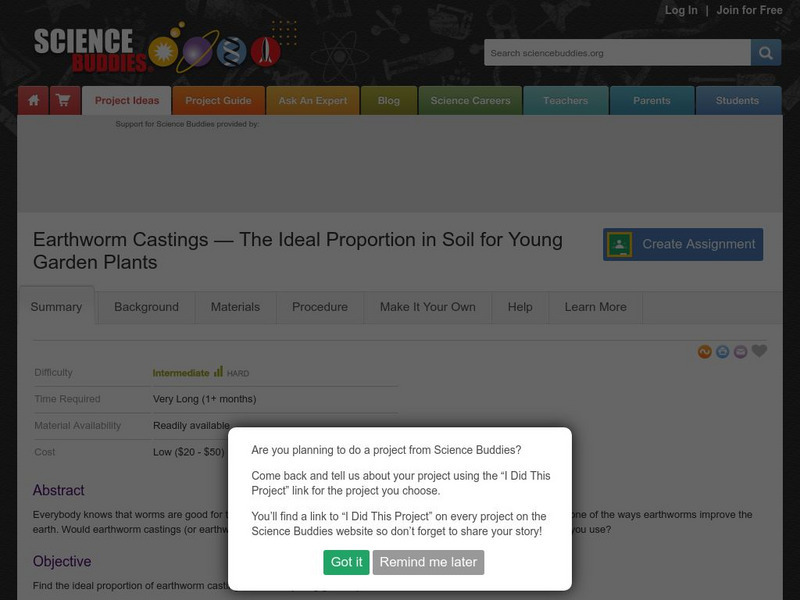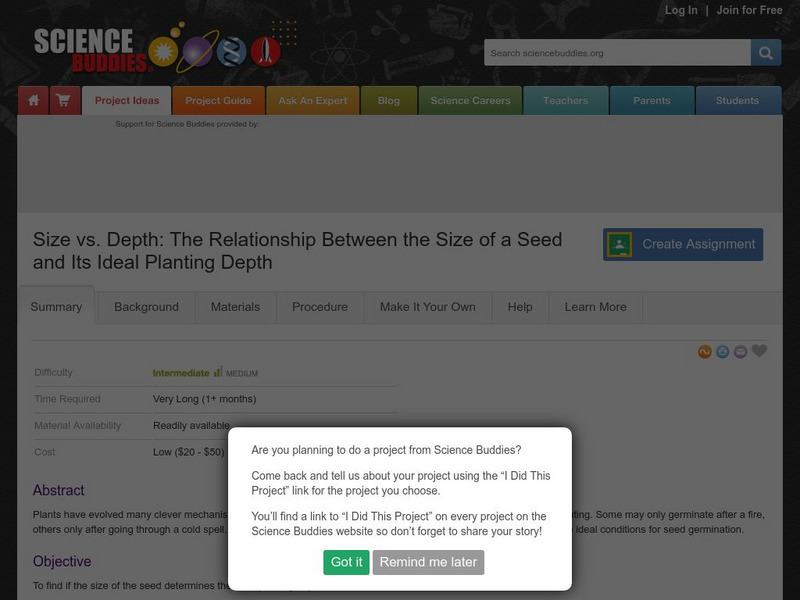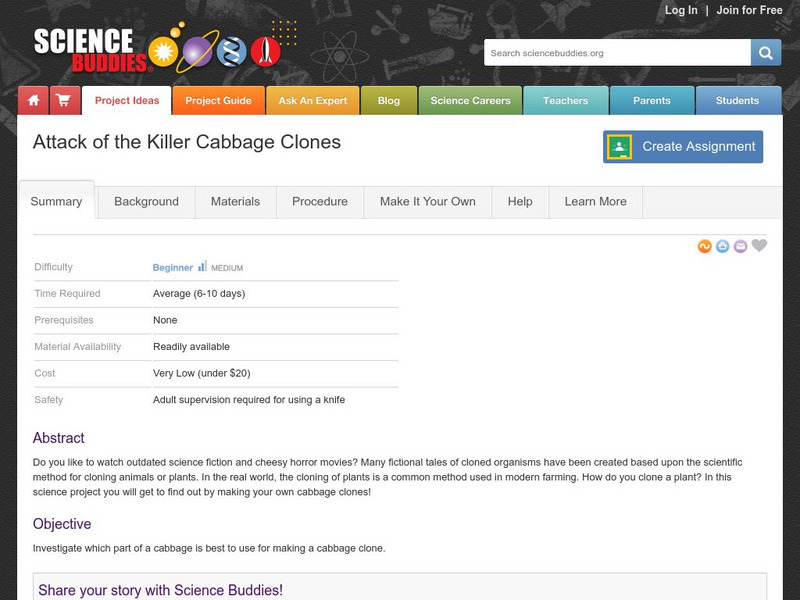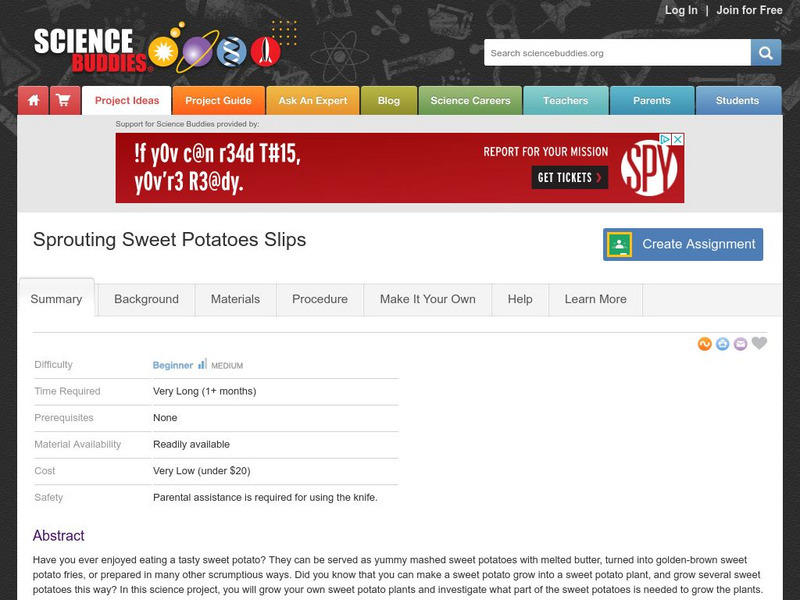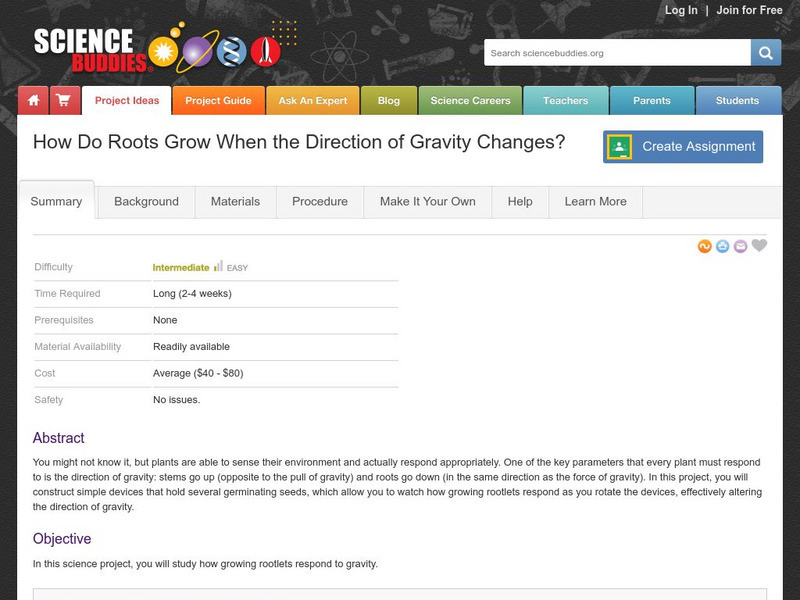Curated OER
Life Cycle: Diversity in a Balance 4th Grade Workbook
In this life cycle workbook, 5th graders examine plant and animal cells, classification of organisms, human biology, photosynthesis, and natural environments. 21 different activities make up the Life Cycle Workbook.
Curated OER
Lichen Looking
Students explore plant biology by participating in field trip activities. In this botany lesson, students identify the term "lichen" and discuss where lichens can be found as they explore a nature area on their class field trip. Students...
Curated OER
Growing Plants
Students explore plants and recognize that they are living things that require light and water to grow. In this online plant biology lesson, students identify, name and match the parts of plants. Extension activities and suggested...
Curated OER
Root, Root, Root for the Nutrients
Students observe the growth of a seed, predict what will happen when seeds are planted without soil, and conduct an experiment using a hydroponics system.
Science Buddies
Science Buddies: Project Ideas: Rad Radishes: Irradiation on Seed Germination
In this plant biology science fair project, students will investigate effects of irradiation on seed germination. The Science Buddies project ideas are set up consistently beginning with an abstract, objective, and introduction, followed...
Science Buddies
Science Buddies: Project Ides: Propagate Plants Without Using Seeds!
This plant biology science fair project that explores factors involved in successful propagation of plants using plant division instead of seeds. The Science Buddies project ideas are set up consistently beginning with an abstract,...
Science Buddies
Science Buddies: Project Ideas: Plants on the Move: Phototropism
A plant biology science fair project exploring how various levels of light affect plant growth. The Science Buddies project ideas are set up consistently beginning with an abstract, objective, and introduction, followed by a section on...
Science Buddies
Science Buddies: Weeds Be Gone! Experiment That Affect Roundup Weed Killer
Experiment with factors that affect the activity of the weed killer Roundup. The Science Buddies project ideas are set up consistently beginning with an abstract, objective, and introduction, followed by a section on terms, concepts, and...
Science Buddies
Science Buddies: Earthworm Castings: Soil for Young Garden Plants
Everybody knows that worms are good for the soil, but not everybody knows why. Here's a project that investigates just one of the ways earthworms improve the earth.
Science Buddies
Science Buddies: Cryopreservation: Freezing Plant Tissues
Cryopreservation-storing seeds in ultra-cold liquid nitrogen-is one method for maintaining plant genetic stocks in seed banks. The purpose of this project is to observe the characteristics and outcomes of cryogenically frozen seedlings...
Science Buddies
Science Buddies: Planting Size vs. Depth
Plants have evolved many clever mechanisms to ensure that their seeds will wait for appropriate conditions before sprouting. Some may only germinate after a fire, others only after going through a cold spell. This project explores one...
Science Buddies
Science Buddies: Radiant Radish Seeds
We all know that plants need sunlight and water to grow big and tall. But did you know that inside seeds are baby plants, and that the fragile baby plant inside the seed needs to be protected? If you've ever had a sunburn, you also know...
Science Buddies
Science Buddies: Nitrogen Fixing Bacteria and Nitrogen Fertilizers
Plants need nitrogen to build proteins and nucleic acids to grow healthy stems and leaves. Though the Earth's atmosphere is made up of 79% nitrogen, the form of nitrogen found in the atmosphere cannot be used by plants. In this...
Science Buddies
Science Buddies: It's Crowded in Here! A Study of Plant Population Density
Like humans, plants can be negatively affected by overcrowding. Unlike humans, plants cannot get up and move to a new environment or explore how to utilize new resources. This experiment will explore the effects of crowding (population...
Science Buddies
Science Buddies: Gone With the Wind: An Experiment on Seed and Fruit Dispersal
If you have ever made a wish and blown the fluff of a dandelion, you have witnessed how some plants are adapted to spreading their seeds using the wind. The tiny, furry parachute allows the seeds to be picked up by the wind and to be...
Science Buddies
Science Buddies: Plants Are on the Move! A Study of Gravitropism
As we humans zip from place to place, we often forget to stop and smell the roses. Compared to our fast-paced lifestyle, plants seem rooted to the spot. Don't be deceived by appearances however, plants are on the move. This experiment...
Science Buddies
Science Buddies: Leaves and Light
Leaves use sunlight to make food for the plant. Sunlight contains all of the colors of the rainbow, but are all of those colors used by the leaf? Can you find out if some colors of light are more important than others?
Science Buddies
Science Buddies: Attack of the Killer Cabbage Clones
Do you like to watch outdated science fiction and cheesy horror movies? Many fictional tales of cloned organisms have been created based upon the scientific method for cloning animals or plants. In the real world, the cloning of plants...
Science Buddies
Science Buddies: Do Potatoes Regulate the Formation of New Roots?
Propagate potatoes by giving it the right environment for the eyes to sprout.
Science Buddies
Science Buddies: Shoots: How Do Mint Plants Branch to Form New Stems?
Do you like to climb trees? The branches of trees are what make them so fun to climb. Each branch starts out as a tiny shoot that grows out from a stem. How is the growth of shoots along a stem regulated?
Science Buddies
Science Buddies: How Many Seeds Do Different Types of Fruit Produce?
Do you like your strawberry jelly with or without the seeds? Are you glad to have a seed-free watermelon, or do you enjoy spitting the seeds into the garden? You might not like to find seeds in your fruit, but fruit is nature's way of...
Science Buddies
Science Buddies: How Do Roots Grow When the Direction of Gravity Changes?
You might not know it, but plants are able to sense their environment and actually respond appropriately. One of the key parameters that every plant must respond to is the direction of gravity: stems go up (opposite to the pull of...
Science Buddies
Science Buddies: Reveal the Red: Exploring the Chemistry of Red Flower Pigments
Are all reds the same? Find out in this science fair project. Investigate if the pigments in one type of red flower are different from those in another type of red flower. Flowers contain an assortment of amazing chemicals that produce...
Science Buddies
Science Buddies: Vines & Spines: Thigmotropism in Morning Glory Tendrils
We tend to think of plants as immobile, but the tendrils of a vine, such as the morning glory, actually move in response to touch. Tendrils wrap around structures, which give the plant something to grow on. In this science fair project,...










